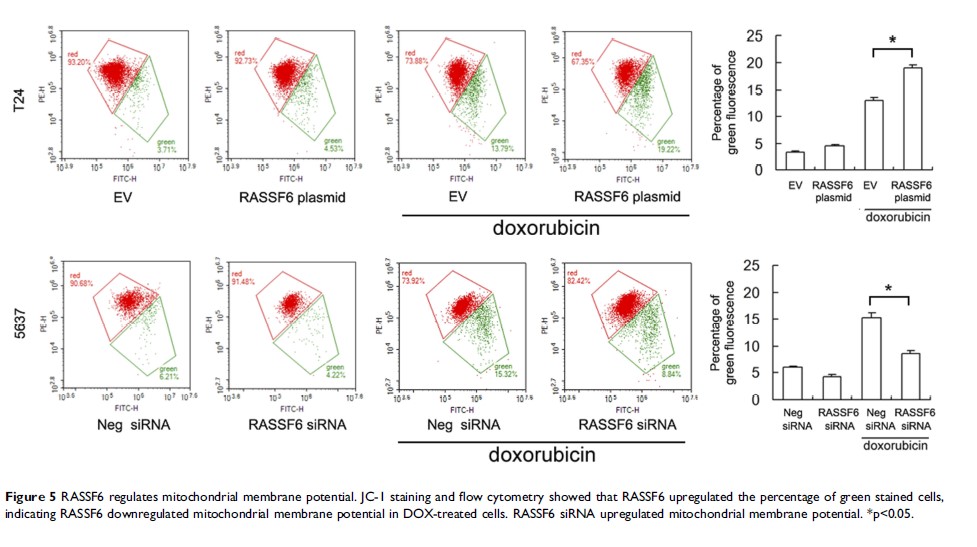9 0 8 0 2
论文已发表
注册即可获取德孚的最新动态
IF 收录期刊
- 2.6 Breast Cancer (Dove Med Press)
- 3.9 Clin Epidemiol
- 3.3 Cancer Manag Res
- 3.9 Infect Drug Resist
- 3.6 Clin Interv Aging
- 4.8 Drug Des Dev Ther
- 2.8 Int J Chronic Obstr
- 8.0 Int J Nanomed
- 2.3 Int J Women's Health
- 3.2 Neuropsych Dis Treat
- 4.0 OncoTargets Ther
- 2.2 Patient Prefer Adher
- 2.8 Ther Clin Risk Manag
- 2.7 J Pain Res
- 3.3 Diabet Metab Synd Ob
- 4.3 Psychol Res Behav Ma
- 3.4 Nat Sci Sleep
- 1.9 Pharmgenomics Pers Med
- 3.5 Risk Manag Healthc Policy
- 4.5 J Inflamm Res
- 2.3 Int J Gen Med
- 4.1 J Hepatocell Carcinoma
- 3.2 J Asthma Allergy
- 2.3 Clin Cosmet Investig Dermatol
- 3.3 J Multidiscip Healthc

RASSF6 在人膀胱癌中被下调,并通过河马信号通路调节阿霉素敏感性和线粒体膜电位
Authors Tan S, Bian X, Wu B, Chen X
Received 24 May 2019
Accepted for publication 25 September 2019
Published 5 November 2019 Volume 2019:12 Pages 9189—9200
DOI https://doi.org/10.2147/OTT.S217041
Checked for plagiarism Yes
Review by Single-blind
Peer reviewers approved by Ms Shreya Arora
Peer reviewer comments 2
Editor who approved publication: Dr Sanjeev Srivastava
Background: The present study aimed to investigate the clinicopathological significance and biological roles of RASSF6 in human bladder cancers.
Materials and methods: Immunohistochemistry and Western blots were used to examine the protein expression of RASSF6 in bladder cancer tissues. Biological roles of RASSF6 were examined using MTT, colony formation assay, Matrigel invasion assay, cell cycle analysis, AnnexinV/PI staining and JC-1 staining. Western blot analysis was used to examine the potential mechanism.
Results: We found that RASSF6 was downregulated in 73 of 138 bladder cancer specimens, which correlated with advanced stages. RASSF6 overexpression decreased the cell growth rate and inhibited invasion ability in T24 cell line. Downregulation of RASSF6 using siRNA increased the cell proliferation rate and promoted invasion in 5637 cell line. Cell cycle studies showed that RASSF6 overexpression suppressed the process of cell cycle progression. RASSF6 overexpression also increased the cellular response to doxorubicin (DOX) treatment. AnnexinV/PI staining showed that RASSF6 overexpression promoted DOX-induced apoptosis with increased cytochrome c and cleavage of caspase-3 and caspase-9. We also showed that RASSF6 overexpression downregulated the mitochondrial membrane potential, while RASSF6 depletion showed the opposite effect. Western blot analysis demonstrated that RASSF6 overexpression repressed p-Rb and Bcl-xL while upregulating p21 expression. In addition, we found that RASSF6 overexpression affected the Hippo signaling pathway by downregulating YAP. Depletion of YAP downregulated Bcl-xL expression and abolished the effect of RASSF6 on Bcl-xL. Depletion of YAP also upregulated the level of apoptosis and downregulated mitochondrial membrane potential. YAP siRNA abolished the effects of RASSF6 on DOX-induced apoptosis and loss of mitochondrial membrane potential.
Conclusion: Taken together, our results showed that RASSF6 was downregulated in bladder cancers. RASSF6 inhibited cell proliferation and invasion, as well as the progression of cancer, by regulating DOX sensitivity and mitochondrial membrane potential, possibly via the Hippo signaling pathway.
Keywords: RASSF6, bladder cancer, Hippo, YAP
